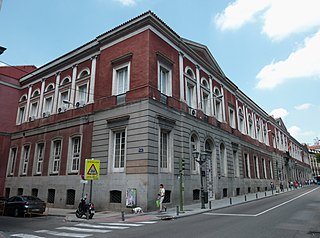
Ginés González García was an Argentine politician and physician who served twice as the country's Minister of Health under the successive presidencies of Eduardo Duhalde and Néstor Kirchner, from 2002 to 2007, and under President Alberto Fernández, from 2019 to 2021. A specialist in public healthcare, González García also served as Argentine Ambassador to Chile from 2007 to 2015.

The Academy of Cinematographic Arts and Sciences of Spain is a professional organisation dedicated to the promotion and development of Spanish cinema. Founded in 1986, it is responsible for the annual Goya Awards, Spain's principal film awards. It is headquartered in Madrid.

Álvaro de Figueroa y Torres, 1st Count of Romanones was a Spanish politician and businessman. He served as Prime Minister three times between 1912 and 1918, president of the Senate, president of the Congress of Deputies, Mayor of Madrid and many times as cabinet minister. He belonged to the Liberal Party. Romanones, who built an extensive political network, exerted a tight control on the political life of the province of Guadalajara during much of the Restoration period. He also was a prolific writer, authoring a number of history essays.

The Spanish Royal Academy of Sciences is an academic institution and learned society that was founded in Madrid in 1847. It is dedicated to the study and research of mathematics, physics, chemistry, biology, engineering, and related sciences.

Carlos Emilio Juan Zurita y Delgado, Duke of Soria and Hernani, is a Spanish physician and the husband of Infanta Margarita, Duchess of Soria. He is a brother-in-law of King Juan Carlos I and the uncle of the current Spanish king, Felipe VI.

Eduardo Estrella Aguirre was an Ecuadorian doctor and researcher who published Flora Huayaquilensis: The Botanical Expedition of Juan Tafalla 1799-1808.

The Royal Academy of Engineering is Spanish institution whose purpose is to promote works and studies that reflect scientific progress in the field of engineering, its technological applications and its operational techniques.

Diego Manuel de Argumosa y Obregón was a Spanish doctor and the chair of surgery of the School of Medicine at the University of Madrid. Known as "the restorer of Spanish surgery", he was an innovator in the field of medical science. He is recognized for running the first clinical trial and for encouraging the use of anesthesia in Spain, introducing ether in 1847.

Manuel García Velarde is a Spanish physicist and university professor, currently a member of the Academia Europaea, the Royal Academy of Doctors of Spain and the European Academy of Sciences. Velarde has worked in American and European universities and research organizations, focusing on fluid dynamics and other non-linear problems, including the kinetic and thermodynamic theories, hydrodynamic and interfacial instabilities, anharmonic lattices and electronics.
The Royal Madrilenian Academy of Medicine, formally established in 1734, was an academic society dedicated to the study of natural history, natural philosophy, and medicine based in Madrid under the auspices of King Philip V of Spain.

Alberto Sols García (1917–1989) was a Spanish researcher specializing in biochemistry, working especially on hexokinases. He effectively created biochemistry as a major discipline in Spain.

Miguel Colmeiro y Penido was a Spanish botanist, and member of the Spanish Royal Academy of Sciences.

Rafael Rodríguez Méndez was a Spanish doctor, author, and politician. He was rector of the University of Barcelona from 1902 to 1905. He was also director of the San Baudilio de Llobregat asylum, where he stood out for the application of Music Therapy. He is the author of several medical treatises, including the very first medical statistics done in Catalonia.
Francisco Javier Blanco García, is a Spanish medical professional who has established a notable career in the field of rheumatology. He holds the position of full professor in the Department of Physiotherapy, Medicine, and Biomedical Sciences at the Universidad de A Coruña. Additionally, he serves as the Head of the Clinical and Translational Rheumatology Section at the A Coruña University Hospital and is the Coordinator of the Rheumatology-Health Research Group at INIBIC and CICA-UDC. Francisco J Blanco is also a Corresponding Academic of the Royal National Academy of Medicine of Spain, the Royal National Academy of Pharmacy of Spain, and the Royal Academy of Medicine and Surgery of Galicia. Recently, he was appointed Director of the Cathedra San Rafael Foundation-UDC.

The Institute of Spain is a Spanish learned society, grouping ten royal academies. The institute is part of the Ministry of Science, Innovation and Universities, which partially funds these organizations.

Julián Calleja y Sánchez was a Spanish anatomist, professor, and politician.














